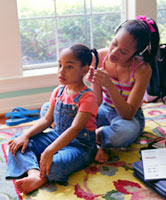- Body
- Fitness
- Nutrition
- Illness &
disability-

- Types of illnesses and disabilities
- Dealing with medical issues
- Coping with your feelings
- Taking care of your body
- Dealing with school
- Relationships
- Becoming independent
- For friends and family
- Stories, celebrities, chats, and other fun stuff
-
Quiz: How much do you know about taking good care of yourself?
-
-
Links to more information
-
-
- Drugs, alcohol
& smoking - Your
feelings - Relationships
- Bullying
- Safety
- Your
future - Environmental
health
Skip section navigation (navigation may have changed)
Section navigation

http://www.girlshealth.gov/
Relationships
Young caregivers

There are over one million young people in the United States who take care of someone in their family. So, if you are taking care of someone in your family, you are not alone! You might need to watch your brothers or sisters so your parents or guardians can work. Or you might take care of a family member with an illness or disability.
Caring for someone else can be tough for an adult. It can be even tougher for a young person. You may have less time for schoolwork or you may feel like you don’t have any time to just be a kid. Your friends may not understand what you’re going through. Sometimes it feels good to take care of someone else and sometimes you may feel sad or worried. These feelings are normal. You need to take care of yourself, too.
- If you are angry, sad, or worried, talk to a trusted adult, like your school counselor.
- Write in your diary or draw a picture about how you’re feeling.
- Make some time each day for fun.
- Keep in mind, it’s okay to say no sometimes and it’s okay to want things for yourself.
- Ask for help. Is there someone in your family, a family friend, or a neighbor who can help you?
To learn more, visit the American Association for Caregiving Youth.

I’m taking care of a family member. When can I find support?
If you’re taking care of a family member, try these places that can help support you:
- A school nurse or counselor
- Web-based support groups or blogs
- Camps
Some organizations that help young caregivers include:

Content last updated September 22, 2009





